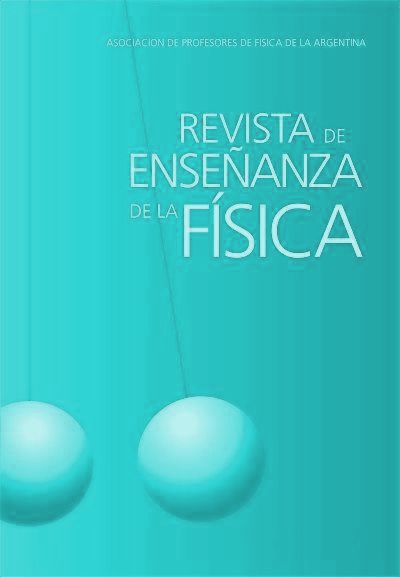Learning conceptions found in Physics Education Research with small group settings
DOI:
https://doi.org/10.55767/2451.6007.v32.n1.28933Keywords:
Learning; Small group; Physics Teaching; Literature reviewAbstract
Diverse strategies are created to analyze students’ learning processes. These strategies provide clues about how the researchers perceive learning. We searched the conceptions of learning shown in investigations in which students are organized in small groups in Physics classes. We analyzed 42 articles published between 2012 and 2017 in journals made available and classified as highest credibility by CAPES (Brazil). We categorized them according to concepts of mind brought from the literature. Our findings show that learning is mostly perceived as a social activity of sharing meanings (n=25). We also found 5 articles with divergent conceptions in their sections (Data Analysis and Theoretical Framework). Finally, we propose that the categories created in this study can be used as tools to evaluate how tests, instruction and research target learning.
References
Bereiter, C.e Scardamalia, M. (1996). Rethinking Learning. Em David R. Olson and N. Torrance (Eds.), The Handbook of Education and Human Development: New Models of Learning, Teaching, and Schooling, Cambridge: Blackwell.
Cohen, E. G. (1994). Restructuring the Classroom: Conditions for Productive Small Groups. Review of Educational Research, 64(1), 1–35.
Dewey, J. (1910). How We Think. Boston: D. C. Heath & Co.
Freire, P. (1982). Educação Como Prática Da Liberdade. Rio de Janeiro: Paz e Terra.
Harlow, J. J. B., Harrison, D. M. e Meyertholen, A. (2016). Effective Student Teams for Collaborative Learning in an Introductory University Physics Course. Physical Review Physics Education Research 12(1), 010138.
Irving, P. W., Martinuk, M. S. e Sayre, E. C. (2013). Transitions in Students’ Epistemic Framing along Two Axes. Physical Review Special Topics - Physics Education Research, 9(1), 1–11.
Leach, J., e Scott, P. (2003). Individual and sociocultural views of learning in science education. Science & education, 12(1), 91-113.
Oliveira, V., Araujo, I. S., e Veit, E. A. (2017). Resolução de problemas abertos no ensino de física: uma revisão da literatura. Revista brasileira de ensino de física, 39(3), e3402.
Oliveras, B., Márquez, C. e Sanmartí, N. (2014). Students’ Attitudes to Information in the Press: Critical Reading of a Newspaper Article With Scientific Content. Research in Science Education 44(4), 603–26.
Olson, D. R. e Bruner, J. S. (1996). Folk Psychology and Folk Pedagogy. Em Olson, D.R. and Torrance, N. (Eds) The Handbook of Education and Human Development: New Models of Learning, Teaching, and Schooling. Cambridge: Blackwell.
Pasqualetto, T. I., Veit, E. A., e Araujo, I. S. (2017). Aprendizagem Baseada em Projetos no Ensino de Física: uma Revisão da Literatura. Revista Brasileira de Pesquisa em Educação em Ciências, 17(2), 551-577.
Pereira, M. M. (2013). Interações Discursivas em Pequeno Grupo Durante uma Atividade Investigativa sobre Determinação da Aceleração da Gravidade. Ensaio - Pesquisa em Educação em Ciências, 15(2), 65–85.
Piaget, J. (2002). Epistemologia Genética. São Paulo: Martins Fontes.
Popper, K. R. (1972). Objective Knowledge: An Evolutionary Approach. Oxford: Clarendon Press.
Rex, L. A.; Steadman, S. C.; Graciano, M. K. (2006). Researching the complexity of classroom interaction. Em Green, J. L. et al. (Eds). Handbook of Complementary Methods in Education Research. New Jersey: Lawrence Erlbaum Assoc.
Sayre, E. C. et al. (2012). Learning, Retention, and Forgetting of Newton’s Third Law throughout University Physics. Physical Review Special Topics - Physics Education Research 8(1), 1–10.
Vygotsky, L. S. 1991. A Formação Social Da Mente: O Desenvolvimento Dos Processos Psicológicos Superiores.São Paulo: Martins Fontes.
Downloads
Published
Issue
Section
License

This work is licensed under a Creative Commons Attribution-NonCommercial-NoDerivatives 4.0 International License.
Aquellos autores/as que tengan publicaciones con esta revista, aceptan los términos siguientes:Los autores/as conservarán sus derechos de copiar y redistribuir el material, bajo los términos estipulados en la Licencia de reconocimiento, no comercial, sin obras derivadas de Creative Commons que permite a terceros compartir la obra bajo las siguientes condiciones:
- Reconocimiento — Debe reconocer adecuadamente la autoría, proporcionar un enlace a la licencia e indicar si se han realizado cambios. Puede hacerlo de cualquier manera razonable, pero no de una manera que sugiera que tiene el apoyo del licenciador o lo recibe por el uso que hace.
- NoComercial — No puede utilizar el material para una finalidad comercial.
- SinObraDerivada — Si remezcla, transforma o crea a partir del material, no puede difundir el material modificado.
- Los autores/as podrán adoptar otros acuerdos de licencia no exclusiva de distribución de la versión de la obra publicada (p. ej.: depositarla en un archivo telemático institucional o publicarla en un volumen monográfico) siempre que se indique la publicación inicial en esta revista.
- Se permite y recomienda a los autores/as difundir su obra a través de Internet (p. ej.: en archivos telemáticos institucionales o en su página web) antes y durante el proceso de envío, lo cual puede producir intercambios interesantes y aumentar las citas de la obra publicada. (Véase El efecto del acceso abierto).










